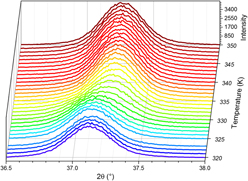Crossref Citations
This article has been cited by the following publications. This list is generated based on data provided by
Crossref.
Yurtseven, H.
Kilit Dogan, E.
Emre, B.
and
Acet, M.
2015.
Calculation of the H–T phase diagram, magnetization and susceptibility in layered structures.
Journal of Magnetism and Magnetic Materials,
Vol. 393,
Issue. ,
p.
544.
Wang, Siming
Ramírez, Juan Gabriel
and
Schuller, Ivan K.
2015.
Avalanches in vanadium sesquioxide nanodevices.
Physical Review B,
Vol. 92,
Issue. 8,
Ramírez, Juan Gabriel
de la Venta, J.
Wang, Siming
Saerbeck, Thomas
Basaran, Ali C.
Batlle, X.
and
Schuller, Ivan K.
2016.
Collective mode splitting in hybrid heterostructures.
Physical Review B,
Vol. 93,
Issue. 21,
Urban, C.
Quesada, A.
Saerbeck, T.
Garcia, M. A.
de la Rubia, M. A.
Valmianski, I.
Fernández, J. F.
and
Schuller, I. K.
2016.
Two state coercivity driven by phase coexistence in vanadium sesquioxide/nickel bulk hybrid material.
Applied Physics Letters,
Vol. 109,
Issue. 11,
Foley, Gabrielle M.
Singamaneni, Srinivasa Rao
Prater, John
and
Narayan, Jay
2016.
Control of Magnetic Coercivity in epitaxial Ni/VO2/YSZ/Si(001) heterostructures by manipulation of Ni thin film growth modes.
MRS Advances,
Vol. 1,
Issue. 50,
p.
3409.
Gilbert, Dustin A.
Ramírez, Juan Gabriel
Saerbeck, T.
Trastoy, J.
Schuller, Ivan K.
Liu, Kai
and
de la Venta, J.
2017.
Growth-Induced In-Plane Uniaxial Anisotropy in V2O3/Ni Films.
Scientific Reports,
Vol. 7,
Issue. 1,
Valmianski, I.
Ramirez, Juan Gabriel
Urban, C.
Batlle, X.
and
Schuller, Ivan K.
2017.
Deviation from bulk in the pressure-temperature phase diagram of
V2O3
thin films.
Physical Review B,
Vol. 95,
Issue. 15,
Wang, Changan
Xu, Chi
Wang, Mao
Yuan, Ye
Liu, Haoliang
Dillemans, Leander
Homm, Pía
Menghini, Mariela
Locquet, Jean-Pierre
Van Haesendonck, Chris
Zhou, Shengqiang
Ruan, Shuangchen
and
Zeng, Yu-Jia
2017.
Coupling of ferromagnetism and structural phase transition in V2O3/Co bilayers.
Journal of Physics D: Applied Physics,
Vol. 50,
Issue. 49,
p.
495002.
Kadiri, A.
Ngantso, G. Dimitri.
EL Amraoui, Y.
Ez-Zahraouy, H.
Elkenz, A.
and
Benyoussef, A.
2018.
Ferromagnetic Nanoparticles of Ising Spin-1 with a Rubik’s Cube Structure: Monte Carlo Simulations.
Journal of Superconductivity and Novel Magnetism,
Vol. 31,
Issue. 12,
p.
4047.
Sutton, L.
Lauzier, J.
and
de la Venta, J.
2018.
Magnetic properties of hybrid V2O3/Ni composites.
Journal of Applied Physics,
Vol. 123,
Issue. 8,
Valmianski, I.
Wang, P. Y.
Wang, S.
Ramirez, Juan Gabriel
Guénon, S.
and
Schuller, Ivan K.
2018.
Origin of the current-driven breakdown in vanadium oxides: Thermal versus electronic.
Physical Review B,
Vol. 98,
Issue. 19,
Drera, Giovanni
Mozzati, Maria C.
Malavasi, Lorenzo
Galinetto, Pietro
and
Sangaletti, Luigi
2018.
Effects of Nearly‐2D Oxygen Vacancy Clustering on the Magnetic Properties of d0 Systems: The Case of Anatase and Rutile TiO2.
physica status solidi (b),
Vol. 255,
Issue. 10,
Torres, Diana L.
Suzuki, Paulo A.
and
Cornejo, Daniel R.
2019.
Evidence of magnetoelastic coupling in NixTi1−x/Ni and NixTi1−x/Co heterostructures grown on Si (1 0 0).
Journal of Magnetism and Magnetic Materials,
Vol. 475,
Issue. ,
p.
772.
Wickramaratne, Darshana
Bernstein, Noam
and
Mazin, I. I.
2019.
Impact of biaxial and uniaxial strain on
V2O3.
Physical Review B,
Vol. 100,
Issue. 20,
Frandsen, Benjamin A.
Kalcheim, Yoav
Valmianski, Ilya
McLeod, Alexander S.
Guguchia, Z.
Cheung, Sky C.
Hallas, Alannah M.
Wilson, Murray N.
Cai, Yipeng
Luke, Graeme M.
Salman, Z.
Suter, A.
Prokscha, T.
Murakami, Taito
Kageyama, Hiroshi
Basov, D. N.
Schuller, Ivan K.
and
Uemura, Yasutomo J.
2019.
Intertwined magnetic, structural, and electronic transitions in
V2O3.
Physical Review B,
Vol. 100,
Issue. 23,
Nord, Magnus
Semisalova, Anna
Kákay, Attila
Hlawacek, Gregor
MacLaren, Ian
Liersch, Vico
Volkov, Oleksii M.
Makarov, Denys
Paterson, Gary W.
Potzger, Kay
Lindner, Jürgen
Fassbender, Jürgen
McGrouther, Damien
and
Bali, Rantej
2019.
Strain Anisotropy and Magnetic Domains in Embedded Nanomagnets.
Small,
Vol. 15,
Issue. 52,
Urban, Christian
Bennett, Steven P.
and
Schuller, Ivan K.
2020.
Hydrostatic pressure mapping of barium titanate phase transitions with quenched FeRh.
Scientific Reports,
Vol. 10,
Issue. 1,
Sutton, L.
Blehm, A.
Lauzier, J.
Malone, K.
Smith, G.
Singh, M.
and
de la Venta, J.
2020.
Effects of W Doping in VO2 on the Magnetic Properties of VO2/Ni Heterostructures.
Journal of Superconductivity and Novel Magnetism,
Vol. 33,
Issue. 8,
p.
2493.
Wang, Ao-pei
Feng, Ming
Qi, Chang-li
Liu, Mei
Jia, Hong-sheng
Wang, Wen
E, Yuan-long
Hu, Ling-long
Wang, Wei
and
Li, Hai-bo
2020.
Enhanced electrical switching of magnetism in the artificial multiferroic CoFeB/Pb(Mg1/3Nb2/3)O3–PbTiO3 heterostructure.
Scripta Materialia,
Vol. 179,
Issue. ,
p.
80.
Zhu, Mingmin
Yu, Guoliang
Zhou, Ziyao
Ren, Wei
Zhou, Hao-Miao
and
Liu, Ming
2020.
Modulation of spin dynamics across metal to insulator transitions in hybrid heterostructures.
Journal of Materials Research and Technology,
Vol. 9,
Issue. 6,
p.
16349.
